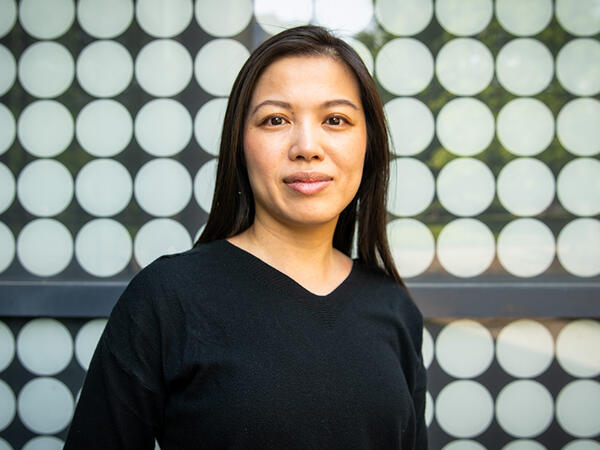What is your academic background and why is this area of research important?
Prior to starting my PhD in the Piquette-Miller lab, I completed a Master of Science in Neuroscience from McGill University and an Honours Bachelor of Science in Pharmacology and Toxicology from the University of Toronto. During this time, I had the opportunity to work on research projects at the Centre for Addiction and Mental Health (CAMH) and the Hospital for Sick Children (SickKids) in Toronto. My current research project in the Piquette-Miller lab examines how autoimmune disease during pregnancy might alter the activity of placental drug transporters. The placenta serves as a protective barrier between the fetus and the mother, where these drug transporters play an essential role in preventing harmful substances from reaching the fetus. Given that many women with autoimmune disease continue to take medications during pregnancy, it is critical to evaluate the potential risk of fetal exposure that may arise from these underlying changes in placental drug transporter activity.
What led you to your current Supervisor’s research group?
Early on in my undergraduate degree, I became very interested in toxicology and drug safety in special patient populations, particularly women and pregnancy. Not only did I find the science fascinating, but the implications on the public health system significant. Women's health is often an overlooked area of research, especially in the context of pharmaceutical sciences. I was very intrigued to learn about Dr. Piquette-Miller's research, as her lab specializes in placental drug transporters and utilizes this knowledge to help improve maternal-fetal health outcomes. I was further drawn to the Piquette-Miller lab due to its strong emphasis on translational research. I am especially excited to have the opportunity to collaborate with local Toronto hospitals and collect human placental samples, while also working to develop complementary pre-clinical animal models.
What are some of the challenges you had to overcome while pursuing your research?
Having recently started my PhD in the Piquette-Miller lab, one of my main challenges has been familiarizing myself with the wide array of specialized techniques employed in placental research. Given that my previous lab work primarily utilized archival brain tissue, learning the methods for collecting, handling, and processing both human and rodent placental samples has been a new experience for me. In addition, transitioning from a background in molecular neuroscience to maternal-fetal health has also been a learning curve. Despite these challenges, my desire and drive to contribute to the field have enabled me to navigate the existing literature and pinpoint current gaps in knowledge to be further investigated. I am very grateful for the support, guidance, and encouragement I have received from my supervisor, labmates, and colleagues as I begin the early stages of my PhD research.
How do you see your current research playing a role in your career?
Women's health is an incredibly important yet complex field of research, offering a wide range of career opportunities. I am especially drawn to a career within the pharmaceutical industry, where I can leverage this translational skillset to pre-clinical drug development, with a focus on maternal-fetal health. I aspire to contribute to the ongoing research efforts aimed at improving and optimizing therapeutic options for women during pregnancy, while also minimizing any risks to the fetus. In addition to my PhD research, I am a trainee with the Canadian Mother-Child Collaborative Training Platform – a program that provides access to expert-led seminars and workshops on perinatal research. This program has further enabled me to broaden my professional and personal networks on a global scale, specifically through participating in the 14th Summer School on Medicines in Brazil this past June. These ongoing experiences will ultimately equip me with the technical skillset, foundational knowledge, and professional connections necessary to succeed in a career in the pharmaceutical industry.
What do you like to do when you are not working on research?
Beyond the lab, I enjoy volunteering with science outreach groups, such as Science Rendezvous and BrainReach, which aim to spark scientific curiosity across various age groups in the community. In my spare time, I like to bake elaborate cakes, ice skate, and play musical instruments, particularly piano and acoustic guitar. I am also fascinated by polar bears and hope to one day visit Churchill, Manitoba – The Polar Bear Capital of the World – to observe them in their natural environment.
More News
Image

Grad to Watch: Jackie Fule Liu’s research focuses on better outcomes for diabetes patients
A recent PhD graduate, Jackie Fule Liu combines hands-on skill and big-picture thinking to help tackle diabetes care challenges.
Read More
Image

U of T community members recognized with Order of Canada
Congratulations to Dean Emeritus and Professor K. Wayne Hindmarsh on his appointment.
Read More
Image

Welcoming Ivy Lam as Academic Lead in Climate, Health & Sustainable Care
Assistant Professor Lam will guide the Leslie Dan Faculty of Pharmacy's efforts to embed environmental sustainability across the Faculty.
Read More
